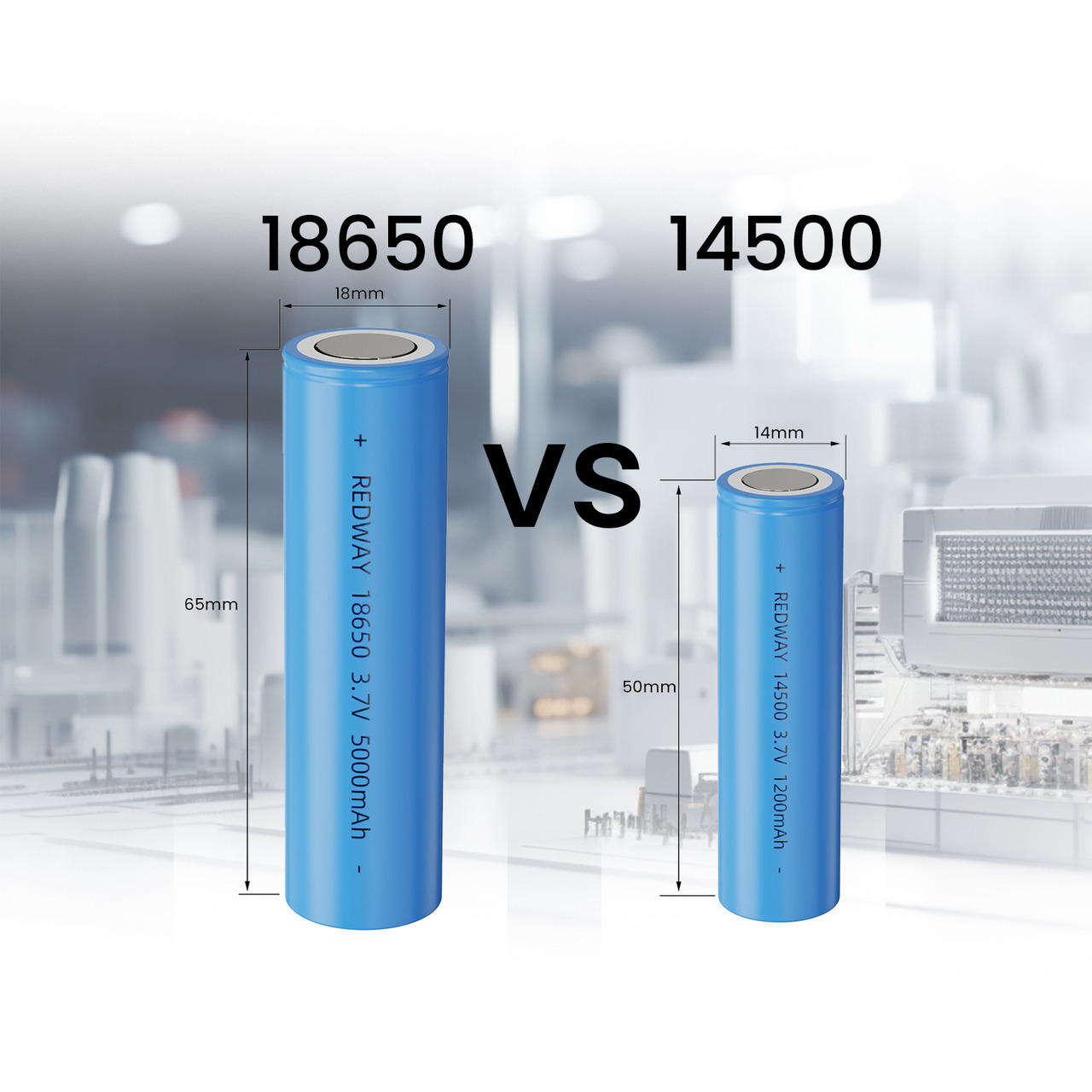Introduction
When it comes to powering your gadgets, choosing the right battery can make all the difference. Among the popular choices are the 18650 vs 14500 Battery. These batteries might seem similar, but they have distinct characteristics that suit different needs. In this article, we'll dive into the details of each battery type, compare their features, and help you decide which one is best for your specific requirements.

What is an 18650 Battery?
The 18650 battery is a type of rechargeable lithium-ion battery commonly used in a variety of applications, from flashlights to laptops. The name "18650" refers to its dimensions: 18mm in diameter and 65mm in length. This battery is known for its high capacity and long lifespan, making it a favorite in both consumer electronics and industrial settings.
What is a 14500 Battery?
The 14500 battery, on the other hand, is also a rechargeable lithium-ion battery, but it's smaller in size. It measures 14mm in diameter and 50mm in length, which is closer to the size of a standard AA battery. Despite its smaller size, it still offers a decent amount of power and is often used in compact devices.
Physical Dimensions and Size Comparison
When comparing the 18650 and 14500 batteries, the most obvious difference is their size. The 18650 is larger, which allows it to store more energy. The 14500, being smaller, is more versatile for devices that have limited space. Here’s a quick comparison:
- 18650: 18mm (diameter) x 65mm (length)
- 14500: 14mm (diameter) x 50mm (length)
Capacity and Power Output
Capacity is one of the most critical factors when choosing a battery. The 18650 battery typically has a capacity ranging from 2000mAh to 3500mAh or even higher, depending on the model. This high capacity translates to longer usage times between charges.
In contrast, the 14500 battery usually offers a capacity of around 600mAh to 1000mAh. While this is significantly lower than the 18650, it can still be adequate for smaller devices that do not require as much power.
Voltage and Performance
Both 18650 and 14500 batteries usually operate at a nominal voltage of 3.7V. However, the performance can vary based on the device they are used in and the specific model of the battery. The 18650 batteries often deliver higher currents, making them suitable for high-drain devices like power tools and vape mods.
Applications and Common Uses
18650 Battery Applications
The 18650 battery is incredibly versatile and can be found in a wide range of applications, including:
- Laptops: Many laptop battery packs are made up of several 18650 cells.
- Flashlights: High-performance flashlights often use 18650 batteries due to their long-lasting power.
- Electric Vehicles: Some electric vehicles use 18650 cells in their battery packs.
- Power Banks: These batteries are common in power banks for charging mobile devices on the go.
14500 Battery Applications
The smaller 14500 battery is perfect for:
- Flashlights: Particularly those designed to be compact and lightweight.
- Portable Electronics: Devices like small radios, cameras, and handheld games.
- Home Security Devices: Many battery-powered security cameras and sensors use 14500 batteries.
Rechargeability and Lifespan
Both 18650 and 14500 batteries are rechargeable, which is a significant advantage over single-use batteries. The lifespan of these batteries depends on the number of charge cycles they can endure. The 18650 batteries generally have a higher cycle count, often ranging between 300 to 500 cycles, or even more with proper care. The 14500 batteries typically offer around 200 to 300 cycles.
Safety Considerations
Safety is paramount when using any battery. Both the 18650 and 14500 batteries come with built-in protection circuits to prevent overcharging, overheating, and short circuits. However, due to their higher capacity and power output, 18650 batteries can pose a greater risk if mishandled. Always use batteries from reputable manufacturers and follow the device guidelines to ensure safe usage.
Cost and Availability
When it comes to cost, 18650 batteries are generally more expensive than 14500 batteries due to their higher capacity and more extensive use in various applications. However, they are widely available, and prices have been decreasing as their popularity grows. The 14500 batteries are cheaper and also readily available, especially for consumer electronics.
Environmental Impact
Rechargeable batteries like the 18650 and 14500 are more environmentally friendly than disposable batteries because they reduce waste. However, they do contain materials that need to be recycled properly. Always dispose of your batteries at designated recycling centers to minimize environmental impact.
Choosing Between 18650 and 14500 Batteries
Choosing the right battery depends on your specific needs. If you require high capacity and long usage times for larger devices, the 18650 battery is your best bet. On the other hand, if you need a compact power source for smaller gadgets, the 14500 battery is the way to go. Consider the device requirements, size constraints, and how often you are willing to recharge the battery.
Conclusion
Both 18650 and 14500 batteries offer unique benefits suited to different applications. Understanding their differences in size, capacity, voltage, and usage can help you make an informed decision. Whether you're powering a laptop, flashlight, or a portable electronic device, there's a battery that fits your needs perfectly.
FAQs
Can I use a 14500 battery in a device that takes AA batteries?
Yes, but only if the device is designed to handle the higher voltage of the 14500 battery, which is 3.7V compared to the 1.5V of a standard AA battery.
How do I know if my device supports 18650 batteries?
Check the device's manual or specifications. Many devices that use 18650 batteries will explicitly mention compatibility.
Are there different types of 18650 batteries?
Yes, 18650 batteries can vary in capacity, discharge rates, and whether they have built-in protection circuits.
Can I charge a 14500 battery with a standard AA battery charger?
No, you need a charger specifically designed for lithium-ion batteries like the 14500.
What should I do if my battery gets hot while charging?
Stop charging immediately and check for any damage or compatibility issues. Overheating can be a sign of a malfunctioning battery or charger.
